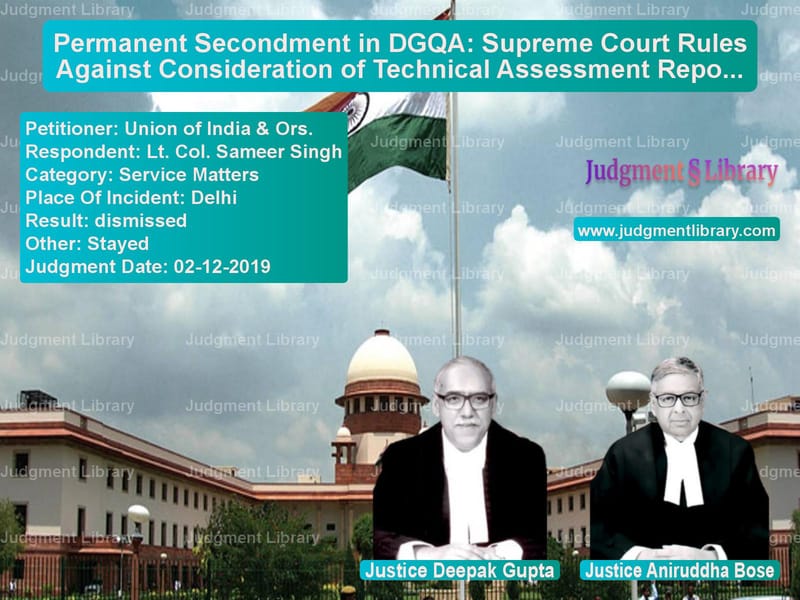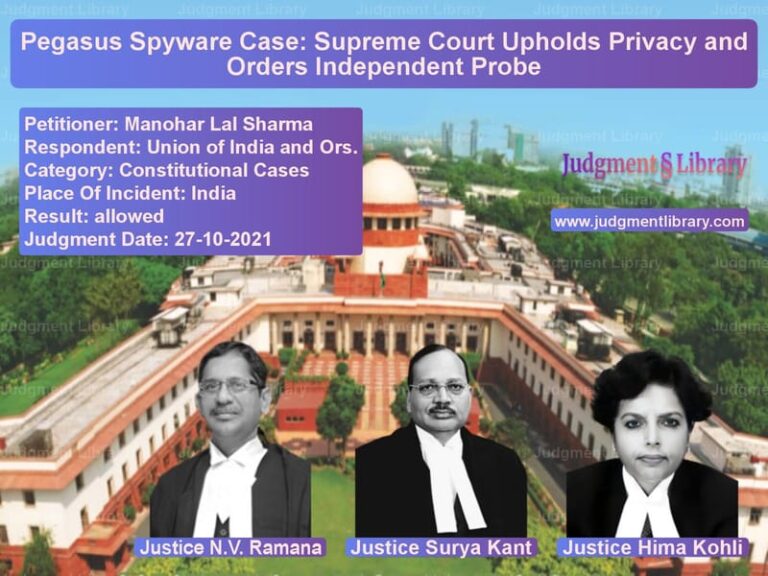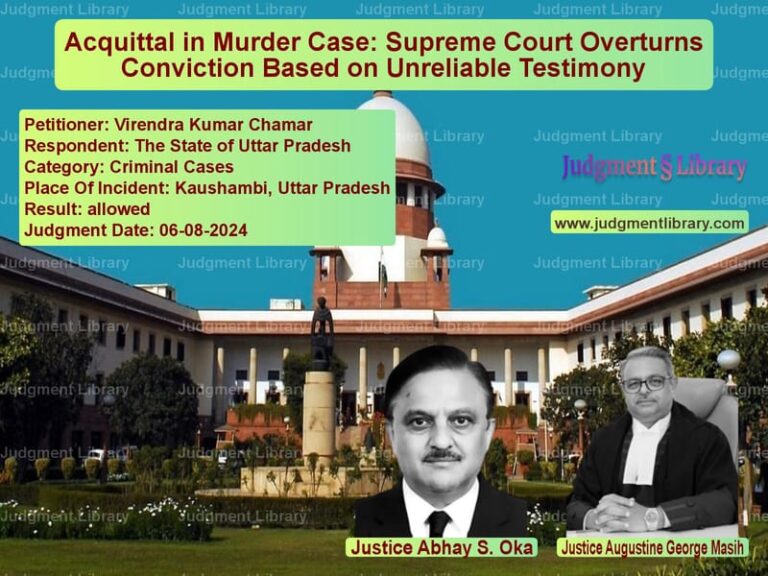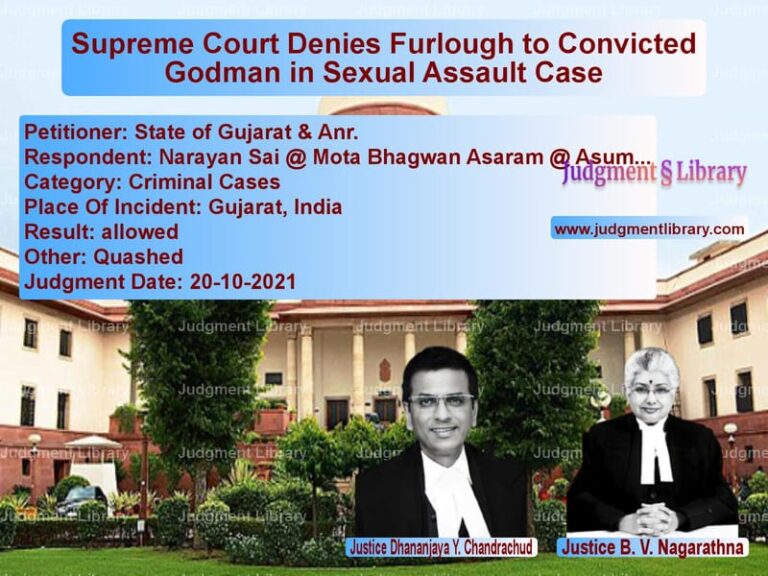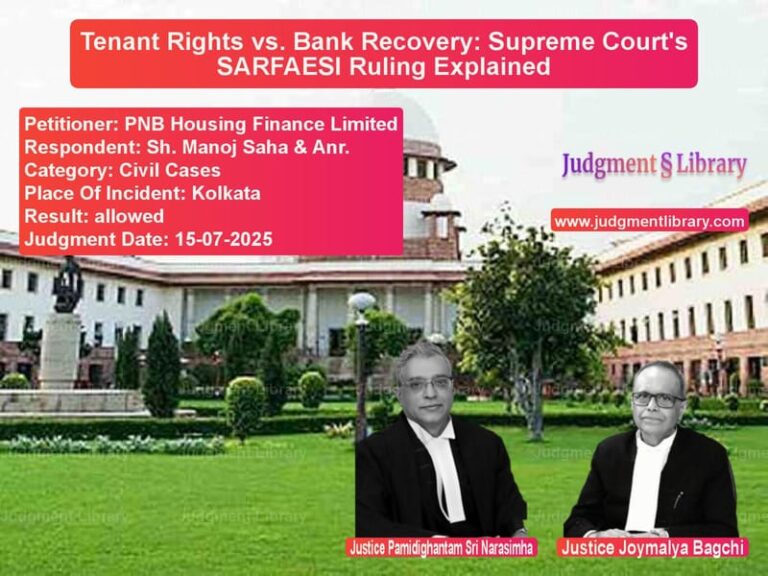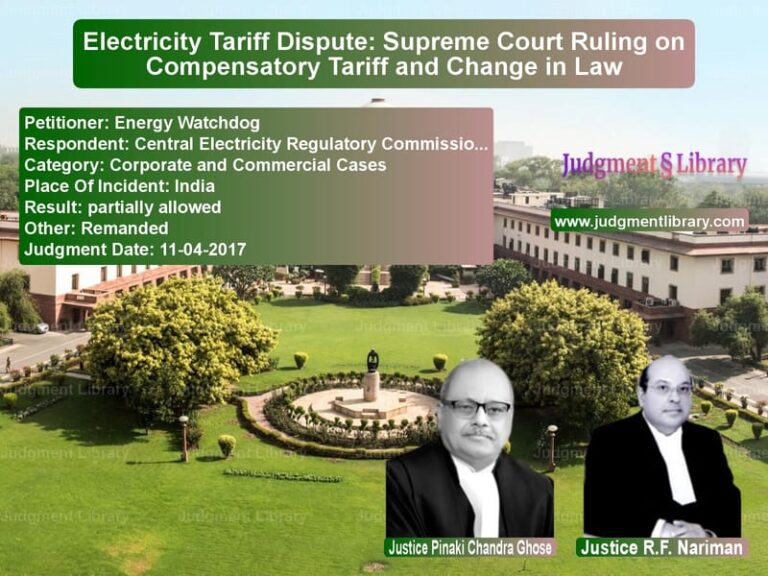Permanent Secondment in DGQA: Supreme Court Rules Against Consideration of Technical Assessment Reports
The case of Union of India & Ors. v. Lt. Col. Sameer Singh is a significant ruling regarding the consideration of Technical Assessment Reports (TARs) in the selection process for Permanent Secondment in the Directorate General Quality Assurance (DGQA). The Supreme Court, in its judgment dated December 2, 2019, upheld the Delhi High Court’s decision that TARs could not be considered after the issuance of a revised Office Memorandum (OM) dated May 12, 2011.
Background of the Case
The respondent, Lt. Col. Sameer Singh, was commissioned in the Indian Army in 1994 and later posted in the DGQA. After completing two years of service in the Collectorate of Quality Assurance, he was eligible for consideration for Permanent Secondment in DGQA.
His case was considered by the Quality Assurance Selection Board (QASB) on February 17, 2016. However, he was not recommended for Permanent Secondment. Upon inquiry, he discovered that his case was rejected based on his TARs from 2014-15 and 2015-16, which rated him as ‘NOT YET FIT’ and ‘NOT FIT’ respectively. Consequently, he was reverted to the Indian Army.
Challenging this decision, Lt. Col. Sameer Singh filed a writ petition before the Delhi High Court, arguing that the revised OM of May 12, 2011, did not list TARs as a criterion for Permanent Secondment and, therefore, they should not have been considered.
Petitioner’s Arguments
The Union of India, as the appellant, argued:
- The previous OM dated April 8, 2004, explicitly included TARs in the selection criteria for Permanent Secondment.
- Although the OM of May 12, 2011, did not explicitly mention TARs, it did not overrule the 2004 OM.
- TARs have always been a crucial assessment tool for evaluating the suitability of officers for DGQA.
- The employer retains the discretion to apply criteria it deems fit for selecting officers for Permanent Secondment.
Respondent’s Arguments
Lt. Col. Sameer Singh contended:
- The OM of May 12, 2011, comprehensively listed the eligibility criteria, and TARs were not included.
- As per Clause 4 of the OM, it superseded all previous instructions and guidelines on the subject, including the 2004 OM.
- The selection process must adhere strictly to the stipulated criteria, and additional requirements cannot be imposed arbitrarily.
- The rejection of his case based on TARs was a violation of the prescribed procedure.
Supreme Court’s Analysis
The Supreme Court examined the previous OMs and the selection criteria mentioned therein. The Court found:
- The OM of May 12, 2011, provided a detailed list of criteria for Permanent Secondment, which included considerations such as minimum service duration, performance grades, medical category, training, and disciplinary record.
- Clause 4 of the OM explicitly stated that it “supersedes all previous instructions/guidelines issued on the subject.”
- If TARs were meant to be part of the selection criteria, they would have been included in the 2011 OM.
- The government had the opportunity to amend the 2011 OM to reintroduce TARs but did not do so.
The Court observed:
“When the office memorandum dated 12.05.2011 is read, it leaves no manner of doubt that it is only the criteria laid down in this memorandum which would apply to all service officers inducted into DGQA on tenure basis after the issuance of this office memorandum.”
The Court also noted that the OM of June 14, 2011, further amended the 2011 policy, stating that officers rejected for Permanent Secondment would not be reconsidered. However, it did not reinstate TARs as a criterion.
Key Legal Precedents Cited
The Supreme Court referred to several key rulings:
- State of Bihar v. Upendra Narayan Singh – Holding that selection procedures must be followed as per prescribed rules and criteria.
- Union of India v. Deepak Kumar – Emphasizing that executive orders must be followed strictly unless modified by competent authority.
- State of Punjab v. Jagdip Singh – Stating that government policies must be interpreted as per their literal meaning and cannot be expanded arbitrarily.
Final Judgment
The Supreme Court dismissed the appeal, ruling:
“The appeal is dismissed, and the judgment of the Delhi High Court is upheld. The Technical Assessment Reports should not have been taken into consideration for Permanent Secondment after the issuance of the office memorandum dated 12.05.2011.”
The Court also vacated the stay granted earlier.
Impact of the Judgment
This ruling has significant implications for military and government selection procedures:
- It reaffirms that selection criteria must be strictly followed as per the governing policy.
- It clarifies that superseding office memoranda invalidate previous selection guidelines.
- It prevents arbitrary additions to selection procedures that disadvantage candidates.
- It strengthens procedural fairness in military administrative decisions.
Conclusion
The Supreme Court’s decision in Union of India & Ors. v. Lt. Col. Sameer Singh ensures that selection processes in government institutions adhere to the latest policies and instructions. By ruling against the consideration of TARs in Permanent Secondment, the judgment safeguards the rights of officers and ensures transparency in administrative decisions.
Petitioner Name: Union of India & Ors..Respondent Name: Lt. Col. Sameer Singh.Judgment By: Justice Deepak Gupta, Justice Aniruddha Bose.Place Of Incident: Delhi.Judgment Date: 02-12-2019.
Don’t miss out on the full details! Download the complete judgment in PDF format below and gain valuable insights instantly!
Download Judgment: Union of India & Ors vs Lt. Col. Sameer Sing Supreme Court of India Judgment Dated 02-12-2019.pdf
Direct Downlaod Judgment: Direct downlaod this Judgment
See all petitions in Employment Disputes
See all petitions in Public Sector Employees
See all petitions in Promotion Cases
See all petitions in Judgment by Deepak Gupta
See all petitions in Judgment by Aniruddha Bose
See all petitions in dismissed
See all petitions in Stayed
See all petitions in supreme court of India judgments December 2019
See all petitions in 2019 judgments
See all posts in Service Matters Category
See all allowed petitions in Service Matters Category
See all Dismissed petitions in Service Matters Category
See all partially allowed petitions in Service Matters Category

